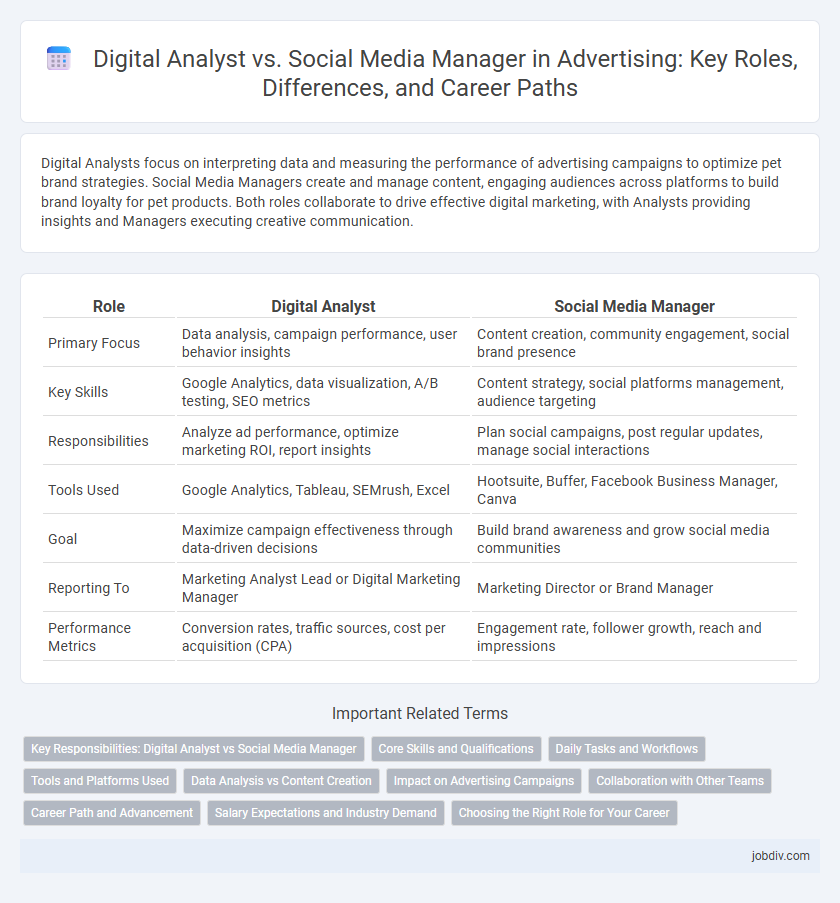Digital Analysts focus on interpreting data and measuring the performance of advertising campaigns to optimize pet brand strategies. Social Media Managers create and manage content, engaging audiences across platforms to build brand loyalty for pet products. Both roles collaborate to drive effective digital marketing, with Analysts providing insights and Managers executing creative communication.
Table of Comparison
| Role | Digital Analyst | Social Media Manager |
|---|---|---|
| Primary Focus | Data analysis, campaign performance, user behavior insights | Content creation, community engagement, social brand presence |
| Key Skills | Google Analytics, data visualization, A/B testing, SEO metrics | Content strategy, social platforms management, audience targeting |
| Responsibilities | Analyze ad performance, optimize marketing ROI, report insights | Plan social campaigns, post regular updates, manage social interactions |
| Tools Used | Google Analytics, Tableau, SEMrush, Excel | Hootsuite, Buffer, Facebook Business Manager, Canva |
| Goal | Maximize campaign effectiveness through data-driven decisions | Build brand awareness and grow social media communities |
| Reporting To | Marketing Analyst Lead or Digital Marketing Manager | Marketing Director or Brand Manager |
| Performance Metrics | Conversion rates, traffic sources, cost per acquisition (CPA) | Engagement rate, follower growth, reach and impressions |
Key Responsibilities: Digital Analyst vs Social Media Manager
Digital Analysts focus on interpreting data trends, measuring campaign ROI, and optimizing digital marketing strategies through detailed analytics and reporting tools. Social Media Managers create and execute content calendars, engage with online communities, and manage brand presence across platforms like Facebook, Instagram, and Twitter to drive audience growth. Both roles collaborate to align data insights with creative social media strategies for enhanced advertising performance.
Core Skills and Qualifications
Digital Analysts excel in data interpretation, proficiency with analytics tools such as Google Analytics and SQL, and a deep understanding of consumer behavior metrics to optimize online campaigns. Social Media Managers demonstrate expertise in content creation, platform-specific strategy development, and engagement metrics, coupled with skills in community management and trend analysis. Both roles require strong communication skills, but Digital Analysts prioritize quantitative analysis while Social Media Managers focus on creative and strategic brand presence.
Daily Tasks and Workflows
Digital Analysts primarily focus on interpreting data from various digital campaigns, analyzing metrics such as click-through rates, conversion rates, and user behavior to optimize advertising strategies. Social Media Managers handle content creation, community engagement, and campaign execution across platforms like Facebook, Instagram, and LinkedIn, ensuring consistent brand messaging and audience interaction. Both roles collaborate closely, with analysts providing data-driven insights that inform the managers' content planning and platform-specific tactics.
Tools and Platforms Used
Digital Analysts primarily use advanced data analytics platforms like Google Analytics, Adobe Analytics, and Tableau to track user behavior and campaign performance. Social Media Managers rely heavily on social media management tools such as Hootsuite, Buffer, and Sprout Social to schedule posts, engage with audiences, and monitor social media metrics. Both roles may utilize CRM systems like Salesforce and marketing automation platforms like HubSpot to optimize advertising strategies across channels.
Data Analysis vs Content Creation
Digital Analysts specialize in interpreting large sets of marketing data to optimize campaign performance and predict consumer behavior. Social Media Managers focus on content creation, crafting engaging posts and managing brand voice across platforms to boost audience interaction. The digital analyst's data-centric approach complements the social media manager's creative strategy for effective advertising outcomes.
Impact on Advertising Campaigns
Digital Analysts leverage data-driven insights to optimize advertising campaigns, enhancing targeting accuracy and maximizing return on investment by analyzing consumer behavior and campaign performance metrics. Social Media Managers execute and adapt campaign strategies on platforms, directly influencing brand engagement and audience growth through content creation and community interaction. The combined impact of these roles drives more precise ad placements and fosters stronger customer connections, significantly boosting campaign success.
Collaboration with Other Teams
Digital Analysts provide data-driven insights to marketing, sales, and product development teams, enhancing campaign performance and customer targeting strategies. Social Media Managers collaborate closely with creative and content teams to align messaging and optimize audience engagement across platforms. Their joint efforts ensure cohesive strategies that drive brand growth and measurable ROI.
Career Path and Advancement
Digital Analysts advance by mastering data analytics tools and obtaining certifications in platforms like Google Analytics and Tableau, enabling progression to roles such as Data Scientist or Marketing Strategist. Social Media Managers develop expertise in content creation, community engagement, and social advertising, often advancing to positions like Social Media Director or Brand Manager. Both career paths offer opportunities for leadership roles, but Digital Analysts emphasize data-driven decision-making while Social Media Managers focus on audience engagement and brand presence.
Salary Expectations and Industry Demand
Digital Analysts typically earn between $65,000 and $95,000 annually, reflecting high demand for expertise in data-driven marketing strategies, while Social Media Managers command salaries ranging from $55,000 to $85,000 due to their role in brand engagement and content creation. Industry demand for Digital Analysts is rapidly increasing as companies prioritize data analytics to optimize advertising ROI, whereas Social Media Managers remain vital for managing brand presence across multiple platforms. Both roles are essential in the advertising landscape, but Digital Analysts generally attract higher salary expectations due to specialized technical skills and analytical capabilities.
Choosing the Right Role for Your Career
Choosing between a Digital Analyst and a Social Media Manager depends on your skills and career goals; Digital Analysts specialize in data interpretation, performance metrics, and optimizing marketing campaigns through analytics tools like Google Analytics and SEMrush. Social Media Managers focus on content creation, community engagement, and brand awareness across platforms such as Facebook, Instagram, and LinkedIn. Prioritizing a role requires assessing your proficiency in data analysis versus creative communication and your desire to influence strategy or audience interaction.
Digital Analyst vs Social Media Manager Infographic

 jobdiv.com
jobdiv.com